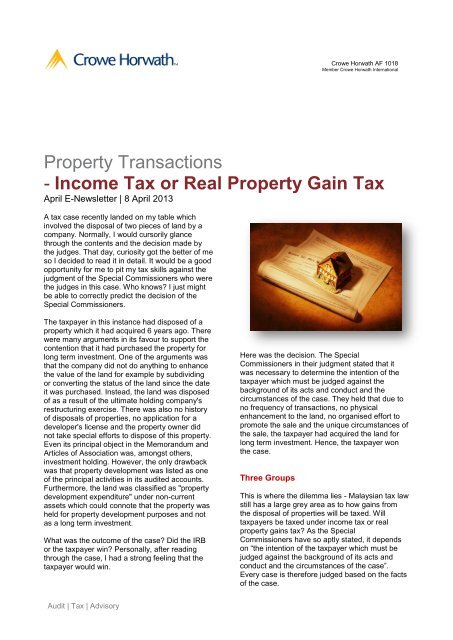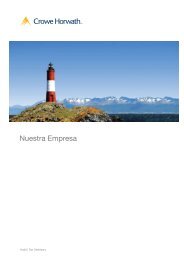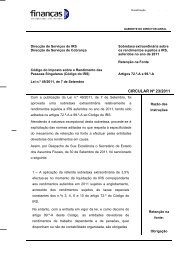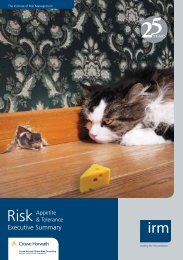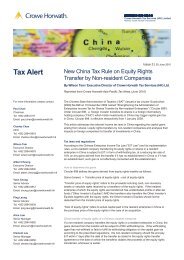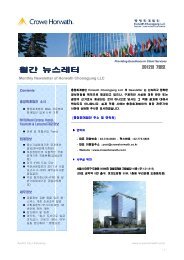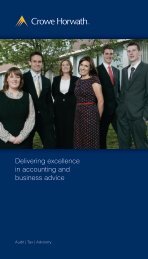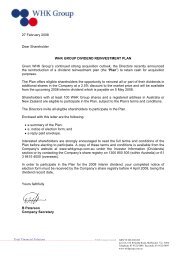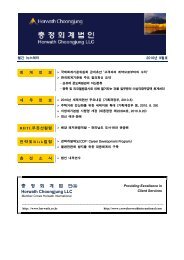Property Transactions - Income Tax or Real Property Gain Tax
Property Transactions - Income Tax or Real Property Gain Tax
Property Transactions - Income Tax or Real Property Gain Tax
Create successful ePaper yourself
Turn your PDF publications into a flip-book with our unique Google optimized e-Paper software.
Audit | <strong>Tax</strong> | Advis<strong>or</strong>y<br />
Crowe H<strong>or</strong>wath AF 1018<br />
Member Crowe H<strong>or</strong>wath International<br />
<strong>Property</strong> <strong>Transactions</strong><br />
- <strong>Income</strong> <strong>Tax</strong> <strong>or</strong> <strong>Real</strong> <strong>Property</strong> <strong>Gain</strong> <strong>Tax</strong><br />
April E-Newsletter | 8 April 2013<br />
A tax case recently landed on my table which<br />
involved the disposal of two pieces of land by a<br />
company. N<strong>or</strong>mally, I would curs<strong>or</strong>ily glance<br />
through the contents and the decision made by<br />
the judges. That day, curiosity got the better of me<br />
so I decided to read it in detail. It would be a good<br />
opp<strong>or</strong>tunity f<strong>or</strong> me to pit my tax skills against the<br />
judgment of the Special Commissioners who were<br />
the judges in this case. Who knows? I just might<br />
be able to c<strong>or</strong>rectly predict the decision of the<br />
Special Commissioners.<br />
The taxpayer in this instance had disposed of a<br />
property which it had acquired 6 years ago. There<br />
were many arguments in its favour to supp<strong>or</strong>t the<br />
contention that it had purchased the property f<strong>or</strong><br />
long term investment. One of the arguments was<br />
that the company did not do anything to enhance<br />
the value of the land f<strong>or</strong> example by subdividing<br />
<strong>or</strong> converting the status of the land since the date<br />
it was purchased. Instead, the land was disposed<br />
of as a result of the ultimate holding company's<br />
restructuring exercise. There was also no hist<strong>or</strong>y<br />
of disposals of properties, no application f<strong>or</strong> a<br />
developer's license and the property owner did<br />
not take special eff<strong>or</strong>ts to dispose of this property.<br />
Even its principal object in the Mem<strong>or</strong>andum and<br />
Articles of Association was, amongst others,<br />
investment holding. However, the only drawback<br />
was that property development was listed as one<br />
of the principal activities in its audited accounts.<br />
Furtherm<strong>or</strong>e, the land was classified as "property<br />
development expenditure" under non-current<br />
assets which could connote that the property was<br />
held f<strong>or</strong> property development purposes and not<br />
as a long term investment.<br />
What was the outcome of the case? Did the IRB<br />
<strong>or</strong> the taxpayer win? Personally, after reading<br />
through the case, I had a strong feeling that the<br />
taxpayer would win.<br />
Here was the decision. The Special<br />
Commissioners in their judgment stated that it<br />
was necessary to determine the intention of the<br />
taxpayer which must be judged against the<br />
background of its acts and conduct and the<br />
circumstances of the case. They held that due to<br />
no frequency of transactions, no physical<br />
enhancement to the land, no <strong>or</strong>ganised eff<strong>or</strong>t to<br />
promote the sale and the unique circumstances of<br />
the sale, the taxpayer had acquired the land f<strong>or</strong><br />
long term investment. Hence, the taxpayer won<br />
the case.<br />
Three Groups<br />
This is where the dilemma lies - Malaysian tax law<br />
still has a large grey area as to how gains from<br />
the disposal of properties will be taxed. Will<br />
taxpayers be taxed under income tax <strong>or</strong> real<br />
property gains tax? As the Special<br />
Commissioners have so aptly stated, it depends<br />
on “the intention of the taxpayer which must be<br />
judged against the background of its acts and<br />
conduct and the circumstances of the case”.<br />
Every case is theref<strong>or</strong>e judged based on the facts<br />
of the case.
Generally, all gains on disposals of properties and<br />
the relevant tax implications thereon may be<br />
categ<strong>or</strong>ized into 3 groups:<br />
a) <strong>Gain</strong>s on sale of a long term investment<br />
These gains are treated as capital gains and<br />
will be subjected to real property gains tax.<br />
The tax rates applicable are 15% f<strong>or</strong><br />
disposals within 2 years of acquisition, 10%<br />
f<strong>or</strong> disposals after 2 years but less than 5<br />
years and nil tax f<strong>or</strong> disposals after 5 years<br />
of acquisition. The question on everyone’s<br />
mind is how long should the holding period<br />
be bef<strong>or</strong>e it is considered as “long term”. Is<br />
there a legal definition f<strong>or</strong> long term? In the<br />
stock market, it is not uncommon f<strong>or</strong><br />
invest<strong>or</strong>s to refer to long term as “one month”<br />
because to them, sh<strong>or</strong>t term means to sell<br />
within T+3 days! Obviously, there will be<br />
difficulties in determining the meaning of<br />
“long-term”. Besides, there is no fixed period<br />
in law to determine when an investment is<br />
deemed long-term. It is all a matter of one’s<br />
judgment and that can be very subjective!<br />
b) <strong>Gain</strong>s on sale of stock-in-trade<br />
Stock-in-trade means raw materials, w<strong>or</strong>k-inprogress<br />
<strong>or</strong> finished goods held with the<br />
intention f<strong>or</strong> sale at a profit. In the context of<br />
properties, stock-in-trade would mean land<br />
that is meant f<strong>or</strong> conversion into completed<br />
units f<strong>or</strong> sale, land that is partly converted<br />
into completed units, completed units<br />
pending sale <strong>or</strong> completed units purchased<br />
expressly f<strong>or</strong> resale. These gains are treated<br />
as trading gains which are subjected to<br />
income tax. The tax rates applicable will<br />
depend on whether the seller is an individual<br />
<strong>or</strong> company and the relevant rates will apply<br />
(scale rates of up to 26% f<strong>or</strong> individuals and<br />
25% flat rate f<strong>or</strong> companies).<br />
Audit | <strong>Tax</strong> | Advis<strong>or</strong>y<br />
Crowe H<strong>or</strong>wath AF 1018<br />
Member Crowe H<strong>or</strong>wath International<br />
c) <strong>Gain</strong>s from an “adventure in the nature of<br />
trade”<br />
The phrase “adventure in the nature of trade”<br />
refers to isolated one-off transactions which<br />
have the semblance of trade and are carried<br />
out with a profit motive. These gains are<br />
treated as trading gains and will be taxed<br />
under income tax. Ordinarily, one-off<br />
transactions are not considered as trading in<br />
nature because they are not frequent and do<br />
not have the character of trade which<br />
involves “frequency of transactions”.<br />
However, if the one-off transaction has the<br />
characteristic of being a trading transaction,<br />
it can be caught as such and will be<br />
subjected to income tax. Experts would use<br />
the “badges of trade” as points of reference<br />
but it is common f<strong>or</strong> views to be different.<br />
How one differentiates these transactions<br />
from sale of long-term investments remains a<br />
grey area. In the classic toilet rolls case of<br />
Rutledge v CIR (14 TC 490), a person had<br />
purchased a large quantity of toilet rolls in a<br />
consignment which was later sold to an<br />
individual f<strong>or</strong> a profit. The taxpayer’s<br />
argument that the toilet rolls were not bought<br />
f<strong>or</strong> profit reasons was over-ruled by the<br />
Inland Revenue and affirmed by the Court.<br />
The taxpayer was deemed to be engaged in<br />
an “adventure in the nature of trade” and<br />
thus, any profits were liable to income tax.<br />
<strong>Gain</strong>s such as this are unlike those from the<br />
acquisition and sale of whisky, a painting <strong>or</strong><br />
jewellery which may be acquired f<strong>or</strong> personal<br />
enjoyment <strong>or</strong> use.<br />
Complications<br />
From the above, one can conclude that<br />
complications can arise from the overlap of the<br />
w<strong>or</strong>ds “long term investment”, “stock-in-trade” and<br />
“adventure in the nature of trade”. When does a<br />
property cross the line from being an investment<br />
into being stock-in-trade? Is it the date of the subdivision<br />
of the land, conversion of the land,<br />
obtaining of layout plan, obtaining of building plan<br />
approval <strong>or</strong> carrying out of earthw<strong>or</strong>ks? What<br />
about isolated one-off property transactions?<br />
What if a person buys a piece of land and sells it<br />
off within two years? When does one cross from<br />
an “adventure in the nature of trade” to a “long<br />
term investment”? The sh<strong>or</strong>t answer to all these<br />
questions is “it all depends on the facts of the<br />
case” and can only be evaluated by judgment.
Certainly, there is much ambiguity and different<br />
interpretations of the w<strong>or</strong>ds used. A person may<br />
view a property investment as a long term<br />
investment whereas another may view it as an<br />
isolated one-off transaction made with a profit<br />
motive. Yet another person may consider it as a<br />
stock-in-trade. You can be sure that 10 different<br />
persons will have 10 different opinions on this<br />
subject. It depends on each person’s perspective<br />
and their interpretations of the w<strong>or</strong>ds above.<br />
How do we then identify the different tax<br />
implications on disposals of property? It would<br />
certainly require a closer look and the necessary<br />
expertise.<br />
Distinguishing The Three<br />
Nevertheless, we can try to use the following<br />
principles to distinguish between the 3 groups of<br />
property transactions above.<br />
Intention<br />
The paramount principle f<strong>or</strong> distinguishing<br />
between the 3 categ<strong>or</strong>ies is “intention” - what was<br />
the intention of the purchaser when he first<br />
purchased the property? Was it f<strong>or</strong> long term<br />
investment <strong>or</strong> was it f<strong>or</strong> development into<br />
completed units <strong>or</strong> was it f<strong>or</strong> a quick sale? All<br />
these questions can only be answered by the<br />
purchaser. It is not possible to reach into the mind<br />
of the purchaser to determine his exact motives<br />
unless he has penned down his thoughts in<br />
writing.<br />
Most purchasers would not have done so <strong>or</strong> may<br />
not be aware of the imp<strong>or</strong>tance of doing so.<br />
Purchasers can say whatever they wish but the<br />
tax auth<strong>or</strong>ities will not accept their reasons unless<br />
there is documentary proof.<br />
Documentary proof <strong>or</strong> evidence is theref<strong>or</strong>e one<br />
of the primary sources f<strong>or</strong> determining the<br />
intention. F<strong>or</strong> example, if a company is<br />
inc<strong>or</strong>p<strong>or</strong>ated with the principal object of property<br />
development acc<strong>or</strong>ding to the Mem<strong>or</strong>andum and<br />
Articles of Association of the company, it will be<br />
difficult to refute this assumption. In the Penang<br />
<strong>Real</strong>ty case, the company disposed of some<br />
property units which it had held f<strong>or</strong> 17 years but<br />
the courts held that the gains on disposal were<br />
subject to income tax because the company was<br />
engaged in property development.<br />
Audit | <strong>Tax</strong> | Advis<strong>or</strong>y<br />
Crowe H<strong>or</strong>wath AF 1018<br />
Member Crowe H<strong>or</strong>wath International<br />
Generally, the courts have over the years held<br />
that a company is inc<strong>or</strong>p<strong>or</strong>ated with the implied<br />
intention to be engaged in business <strong>or</strong> to have a<br />
profit motive. Hence, the likelihood of companies<br />
being held to be engaged in trading activities is<br />
stronger than that f<strong>or</strong> individuals. This would also<br />
be a consideration when analyzing the tax<br />
consequences of disposals of properties.<br />
Notwithstanding whatever proof of intention,<br />
subsequent conduct will throw light on the<br />
purchaser’s intentions. Even though a purchaser<br />
may assert that his intention is f<strong>or</strong> long term<br />
investment, his subsequent conduct may show<br />
otherwise. F<strong>or</strong> example, if a company purchases<br />
a piece of land and disposes of it within a few<br />
months, it is difficult to accept the company’s<br />
contention that it had purchased the property f<strong>or</strong><br />
long-term investment.<br />
Badges of trade<br />
If subsequent conduct is an indicat<strong>or</strong> of intention,<br />
the badges of trade would be the standard<br />
against which the conduct is measured. A badge<br />
is defined in a dictionary as “a device <strong>or</strong> emblem<br />
w<strong>or</strong>n as an insignia of rank, office, <strong>or</strong> membership<br />
in an <strong>or</strong>ganization; an emblem given as an award<br />
<strong>or</strong> hon<strong>or</strong>; a characteristic mark”. A badge is<br />
theref<strong>or</strong>e a characteristic that indicates the<br />
property transaction has the character of a trading<br />
transaction. It is also right to assert that the m<strong>or</strong>e<br />
that any of the subsequent conduct have the<br />
badges of trade, the m<strong>or</strong>e likely the transaction is<br />
caught under income tax.
What are the badges of trade?<br />
The maj<strong>or</strong> badges of trade would include:<br />
The period of holding. The longer the period<br />
of holding, the m<strong>or</strong>e likely the investment is a<br />
long term investment.<br />
Frequency of transactions. The m<strong>or</strong>e<br />
frequent the transactions, the m<strong>or</strong>e likely that<br />
the transaction is held to be trading in nature.<br />
Whether there’s anything done to enhance<br />
the value of the investment. If some activity<br />
had been carried out to enhance the value of<br />
the investment, the m<strong>or</strong>e likely the<br />
investment will be treated as a sale of stockin-trade<br />
<strong>or</strong> as an adventure in the nature of<br />
trade.<br />
Ability to hold the investment f<strong>or</strong> the long<br />
term. This would depend on the method of<br />
financing and whether the invest<strong>or</strong> had the<br />
means to hold the investment without having<br />
to sell it within a sh<strong>or</strong>t holding period.<br />
Method of sale. If the seller has an <strong>or</strong>ganized<br />
method of selling, it would indicate a higher<br />
likelihood of being a trading transaction. In<br />
the case of Martin v Lowry, the taxpayer set<br />
up a sales <strong>or</strong>ganization and employed staff<br />
to advertise and sell the linen goods it had<br />
purchased. The Commissioners decided that<br />
the taxpayer had carried on a trade and that<br />
the profits therefrom were assessable.<br />
Putting all these together and conjuring an<br />
answer would be the road to an accurate<br />
diagnosis. It is not very different from a doct<strong>or</strong><br />
having to diagnose a person based on the<br />
symptoms of cold, cough, fever and aches. There<br />
can be many answers but probably only one is<br />
right. Good diagnosis will depend on sufficiency of<br />
experience, knowledge of the law and deep<br />
understanding of the applicable tax court cases.<br />
Change of intention<br />
Taking the matter further, is it possible f<strong>or</strong> a<br />
person to have an <strong>or</strong>iginal intention and a change<br />
of intention? Certainly this is possible. It will not<br />
be uncommon f<strong>or</strong> a person to have an intention to<br />
purchase a piece of land f<strong>or</strong> long term investment<br />
and subsequently to change the intention to that<br />
of property development.<br />
Audit | <strong>Tax</strong> | Advis<strong>or</strong>y<br />
Crowe H<strong>or</strong>wath AF 1018<br />
Member Crowe H<strong>or</strong>wath International<br />
The tax implications would be found in Para 17A<br />
of the RPGTA where the land in question can be<br />
transferred to stock-in-trade at the date of change<br />
in intention. The “transfer” would be deemed to be<br />
at market value and the gains on the transfer<br />
would be subjected to real property gains tax<br />
whilst the market value of the land will be used as<br />
the cost of the land f<strong>or</strong> the property development<br />
activity. However, the change of intention should<br />
be evidenced by necessary proof. In the case of<br />
Penang <strong>Real</strong>ty, the taxpayer contended it had a<br />
change of intention but the accounts did not<br />
reflect the change. Hence, it lost the court case.<br />
The reverse in change of intention can also be<br />
possible. F<strong>or</strong> example, a person may purchase a<br />
property f<strong>or</strong> property development but<br />
subsequently changes his intention to that of<br />
“property investment”. This change of intention<br />
will cause the taxpayer to be treated as having<br />
“withdrawn stock f<strong>or</strong> his own use” in acc<strong>or</strong>dance<br />
with Section 24(2) of the <strong>Income</strong> <strong>Tax</strong> Act 1967<br />
and be taxed on the gains based on the market<br />
value of the property less the cost.<br />
Conclusion<br />
Being able to identify the problem is a good start.<br />
It will be m<strong>or</strong>e valuable if a solution can be found.<br />
F<strong>or</strong> this, please feel free to contact our tax<br />
partners at fennie.lim@croweh<strong>or</strong>wath.com.my <strong>or</strong><br />
yewhoe.poon@croweh<strong>or</strong>wath.com.my.<br />
Written by:<br />
Poon Yew Hoe<br />
Managing Partner/<strong>Tax</strong> Partner<br />
8 April 2013


